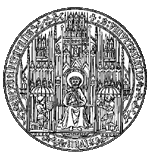
| |
The study programme encompasses the multitude of new conceptual and methodological approaches that are characteristic for the latest developments in the field of molecular cell biology. Students can specifically focus on their individual research projects, and simultaneously, on a broader basis, develop their skills in relevant research areas of molecular cell biology. The programme is designed to enable students to complete their doctoral degree within three years of study. In the programme the students will aquire all qualifications that are necessary to pursue a career in the fields of academic research, biotechnology or biomedicine.
The study programme offers:
1. a wide range of seminars held by external scientists
2. discussion with guest lecturer
3. training in various methods
4. methods seminar held by the members of the doctoral programme
5. annual student retreat
6. thesis committee1. The seminar programme consists of a series of lectures in molecular biology, held by invited speakers as part of the ZMBH Colloquium. This colloquium is organised by the three doctoral programmes based at the ZMBH. Lecturers of the colloquium are encouraged to dedicate a major part of their presentation to basic research issues and illustrate them, whenever possible, with examples from their own research. Presentations will be in English for various reasons. The seminars will provide students with the opportunity to practice their own language skills by following a scientific presentation and actively engaging in discussions. In addition, seminars given by international speakers are included in the seminar series, which will promote interaction between international visiting scientists and doctoral students.
2. An integral part of the Colloquium is a discussion following the seminar in which students will have the opportunity to personally meet the speakers. In order to prepare for such discussions, students receive a relevant review article in advance, which very often has been published by the respective speaker.
The ZMBH Colloquium is complemented by seminars that are organised by the ZMBH group leaders or its doctoral programmes.
3. Outstanding research performance in the field of molecular cell biology requires the application of a multitude of methods in biochemistry, biophysics, molecular biology, cell biology and genetics. The doctoral students will have the opportunity to learn the various techniques employed in any of the laboratories participating in the doctoral programme. For that purpose, the doctoral students can organise short stays in the individual labs to receive up-to-date methodological training by experts who use these techniques routinely.
These methods include:
- Cell fractionation
- Introduction to confocal and electron microscopy
- Chemical and biosynthetic crosslinking
- Yeast genetics
- Cell-free systems for the study of intracellular protein transport
- Lipid modification and analysis
- Reconstitution of membranes
- Tissue culture techniques
- Protein localisation by immunofluorescence analysis
- Antibody production
- Transgenic techniques
- Chemical synthesis and analysis ( oligonucleotide synthesis, protein sequencing, mass spectrometry)
- Use of computer networks and relevant programmes (sequence processing, research of library databases and bibliographies, graphics programmes, using the PhosphorImager and its presentation programme.4. Rotating on a monthly basis, the members of the Molecular Cell Biology programme hold seminars in which they present their own research projects. Particular emphasis is placed on approaches and concepts. This meeting is also a great opportunity for students and members of the doctoral programme to get together and keep in touch with each other.
5. Once a year, students are invited to join a spring meeting, organised by the Molecular Cell Biology doctoral programme and the Sonderforschungsbereich 352. During this retreat students present their research projects.
6. During their doctoral thesis, each student will be assisted by a dissertation committee, which consists of the supervisor and two university lecturers. The dissertation committee has an advisory and an evaluative function. It gives its opinion when the student starts with the thesis and after that on an annual basis. Every student of the doctoral programme needs to write an academic outline at the beginning of his or her research project. This outline will be discussed with the dissertation committee. Following this, the student invites the committee once a year for a discussion of his or her work.
